As a technology, Short Message Service (SMS) has been around as a commercial service since the early 1990s. But with the advent of the cloud and the rise of application programming interfaces (APIs) the overall SMS market has evolved into a $100 billion industry. Starting this week, Plivo, an aggregator of SMS offerings that can be invoked via a single API, appears to be single-handedly starting a price war.

As a technology, Short Message Service (SMS) has been around as a commercial service since the early 1990s. But with the advent of the cloud and the rise of application programming interfaces (APIs) the overall SMS market has evolved into a $100 billion industry. Starting this week, Plivo, an aggregator of SMS offerings that can be invoked via a single API, appears to be single-handedly starting a price war.
Plivo is lowering the cost of outbound messages deliver via SMS by as much as 40 percent across 200 countries. Plivo co-founder and CEO Venky Balasubramanian said because Plivo has been able to aggregate SMS offerings delivered via over 1,600 networks, the company has been able to drive down pricing by negotiating directly with each carrier. Via an API that Plivo exposes as a cloud service that is globally available on multiple distributed hosting environments, Balasubramanian said customers now also now have the option to invoke all SMS offerings available in any given country; as opposed to having to negotiate separate contracts for each service and then manually send out the same message across different networks. In effect, the Plivo API turns all those networks into a single programmable resource.
Beyond the pricing advantages that Plivo can bring to bear as an aggregator, Balasubramanian said other benefits of the Plivo service include the ability to deliver SMS texts more efficiently because Plivocan make sure that each point of delivery for those messages is only one network hop away from the intended recipient. Plivo, added Balasubramanian, can also make sure those SMS texts get delivered in multiple languages.
With the rise of the smartphone usage of SMS texts exploded. Now organizations are using SMS texts for everything from a form of two-factor authentication for transactions to sending URLs through which people download and then activate mobile applications. Marketing executives are especially fond of SMS text as a vehicle for delivering all kinds of marketing messages.
For solution providers SMS texts are often overlooked as vehicle through which they can add value. Now that SMS text services are essentially a programmable resource, however, the number of uses cases for SMS text services inside an enterprise might only be limited by the imagination.
Naturally, it remains to be seen to what degree other providers of SMS text services will continue to drop pricing. But the one thing that is for certain in the age of the cloud is that it’s getting more cost effective to use SMS texts. It may not be the most complicated technology in the world, but it most certainly enjoys the benefit of being among the most proven.
About the Author(s)
You May Also Like


